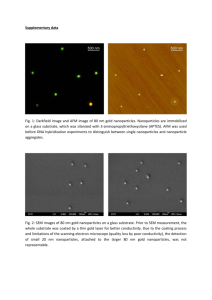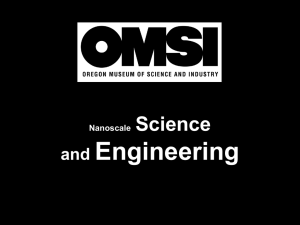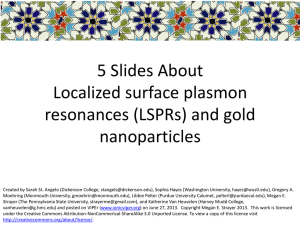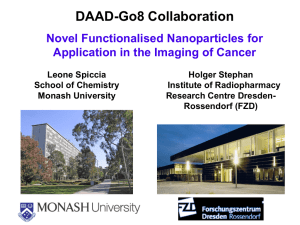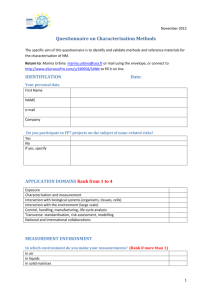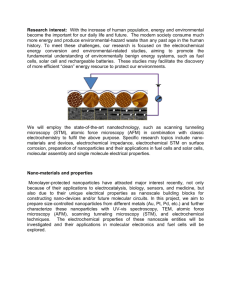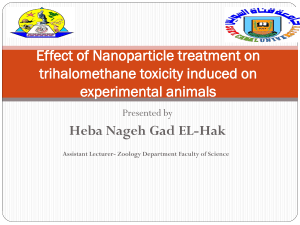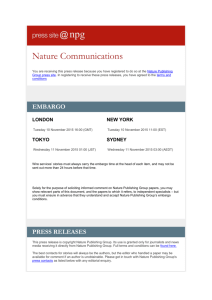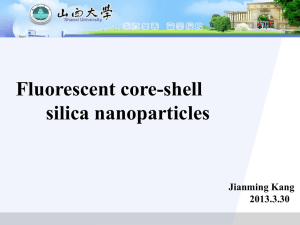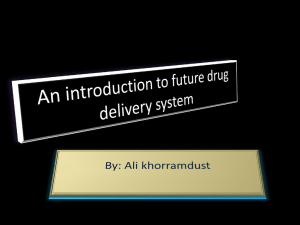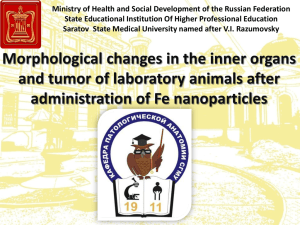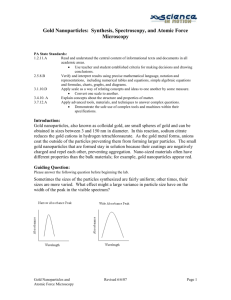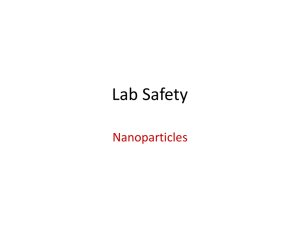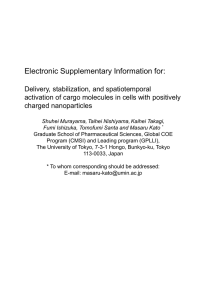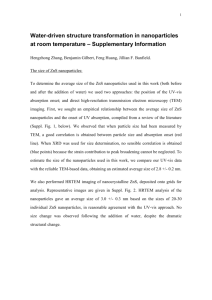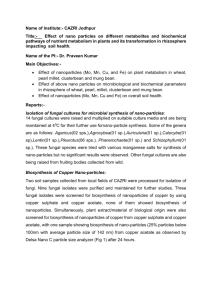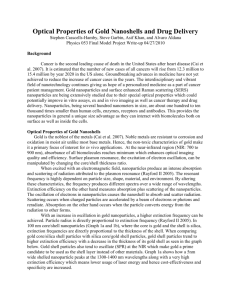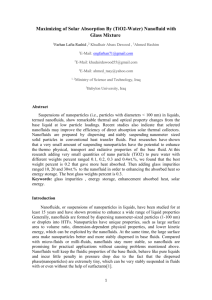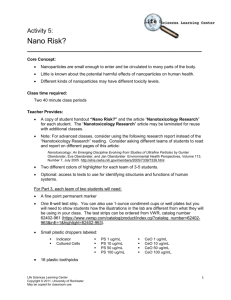nano - School of Chemistry
advertisement
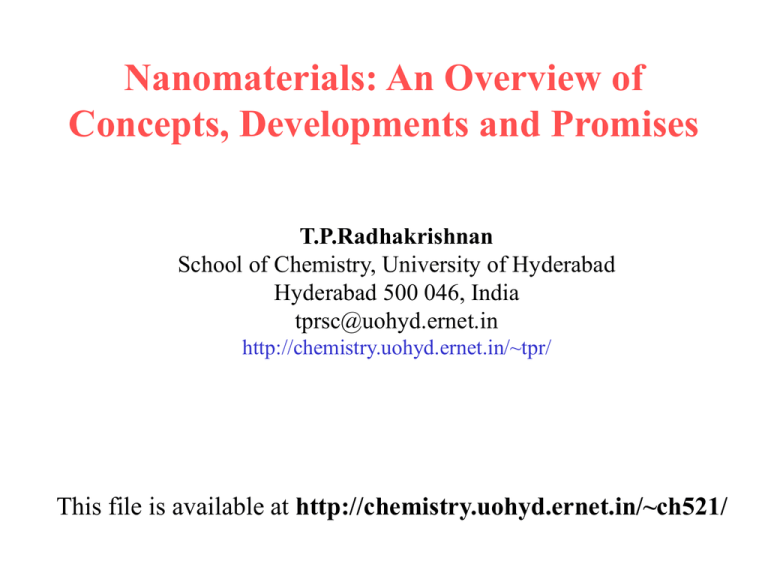
Nanomaterials: An Overview of Concepts, Developments and Promises T.P.Radhakrishnan School of Chemistry, University of Hyderabad Hyderabad 500 046, India tprsc@uohyd.ernet.in http://chemistry.uohyd.ernet.in/~tpr/ This file is available at http://chemistry.uohyd.ernet.in/~ch521/ Different chemical compositions CuSO4.5H2O K2Cr2O7 (NH4)H2PO4 Different structures Carbon Graphite Diamond Fullerene (C60) Properties of materials depend upon : Chemical composition Structure Size changes Silicon Chemical composition Structure centimeter Silicon micrometer nanometer Identical 10+21 m Milky way : 100,000 light years 10-9 m = 1 nanometer (nano is ‘dwarf’ in Greek) 10-16 m mm Decreasing size Quarks μm nm =1/1,000 mm =1/1,000,000 mm The next big thing is small… What are their special properties ? How do you see them ? Nanoscopy Where would you use them ? Electronics / biology connection How do you make them ? Chemistry connection Physics connection The amazing nanoworld Richard Feynmann December 29, 1959 - Annual Meeting of The American Physical Society at Caltech There's Plenty of Room at the Bottom “….. I want to talk about is the problem of manipulating and controlling things on a small scale…..” “As soon as I mention this, people tell me about miniaturization, and how far it has progressed today. They tell me about electric motors that are the size of the nail on your small finger. And there is a device on the market, they tell me, by which you can write the Lord's Prayer on the head of a pin. But that's nothing; that's the most primitive, halting step in the direction I intend to discuss. It is a staggeringly small world that is below.” Feynmann received the Nobel Prize for Physics in 1965 Natural micro and nano objects Human hair ~ 50 – 150 μm wide Red & white blood cells ~ 2 - 5 μm DNA ~ 2.5 nm diameter (Courtsey : Nanoscale Science, Engineering, and Technology in the Office of Basic Energy Sciences (BES) of the U.S. Department of Energy (DOE)) Electron microscope image of DNA 2.5 nm Man-made micro and nano objects Head of a pin ~ 1 – 2 mm Carbon nanotube ~ 2 nm wide Microelectromechanical (MEM) devices ~ 10 – 100 μm wide Pollen grain RBC (Courtsey : Nanoscale Science, Engineering, and Technology in the Office of Basic Energy Sciences (BES) of the U.S. Department of Energy (DOE)) Seeing is believing Wavelength, = 650 nm 10 nm Focal spot of a light beam Resolution in focal plane r 2n sin ~ 4 Resolution normal to plane z n sin λ = wavelength of light α = aperture angle of lens n = refractive index 2 ~ 2 How do we get to ‘see’ these nano objects ? A variety of very powerful microscopies are available these days : Electron microscopy Scanning electron microscopy (SEM) Transmission electron microscopy (TEM) Scanning probe microscopy Atomic force microscopy (AFM) Scanning tunneling microscopy (STM) Transmission Electron Microscope Optical Microscope Atomic Force Microscope In an AFM, nano features are detected by monitoring the movement of a very fine cantilever probe using a laser system. In an STM, a current tunneling between the probe tip and the surface is monitored. The big question : How does one make these tiny tiny objects ? Fabrication of nanomaterials Two general approaches Top-down (Break down) Bottom-up (Build up) Top-down Bottom-up Swarna Bhasma in Ayurvedic medicine 1. Cut purified gold foil into pieces (~ 10 g). 2. Add to 20 g of mercury in a stone mortar & grind. 3. Place the amalgam in an earthen crucible 4. Add sulphur in a 1:1 proportion. 5. Cover with an inverted earthen crucible. 6. Seal by 3 layers of cotton cloth and wet clay. 7. Cover with cow dung cakes (4, 250 g each) in a pit. 8. Heat for 8 h; maximum temperature was ~ 900oC. 9. After cooling, grind the incinerated matter. 10. Repeat the heating with sulphur 42 times. 11. Swarna Bhasma is obtained as a brown red powder. …………………..Sarangadhara-Samhita Gold nanoparticles with size ~ 50 nm Brown et al, Gold Bulletin 2007, 40, 245 Sequential extraction of adsorbed atoms one by one - from Germanium surface Dujardin, G., Mayne, A., Robert, O., Rose, F., Joachim, C., and Tang, H. Science 1998, 251, 1206. Straight groove formed on Silicon surface by repeated scanning at high current (15 nm ×12 nm) Ma, Z.L., Liu, N., Zhao, W.B., Gu, Q.J., Ge, X., Xue, Z.Q., and Pang, S.J. J. Vac. Sci. Technol. B 1995, 13, 1212. Nanocutting with a Nickel nanoparticle knife 1 µm Ni nanoparticles deposited on HOPG and kept at high temperature under Ar/H2 atmosphere – catalytic hydrogenation of carbon (Ci et al, Nano Res. 2008, 1, 116) Chemical route to prepare metal nanoparticles HAuCl4 + Reducing agent → Au + biproducts AgNO3 + Reducing agent → Ag + biproducts Reducing agents : NaBH4 Citrate Alcohol etc.. Stabilising agents : Surfactants Polymers etc.. Faraday’s ‘diffused, divided gold’ ‘finely divided metallic state’ of gold (M. Faraday, Philos. Trans. R. Soc.London, 1857, 147, 145) Source: Whipple Library, Department of History and Philosophy of Science, University of Cambridge [http://www.hps.cam.ac.uk/library/]. Synthesis of gold colloid 10 mg HAuCl4 is weighed out using a spatula wrapped in teflon tape. The HAuCl4 is dissolved in 95 mL water on a hotplate stirrer. Heat the solution to boiling. Citrate reduces the gold(III). Turkevich method (Courtsey : University of Wisconsin - Madison Materials Research Science and Engineering Center – Interdisciplinary Education Group) And now you can write nano letters ! The technique is called dip pen nanolithography. One molecule thick letters are written on the surface of a piece of gold using a molecule called octadecanethiol as the ink. It is then visualized using an atomic force microscope HS Growing nanoparticles inside polymer film Heating oven Metal salt + Polymer in water Spin coating on glass Au nanoplates in PVA matrix Scale bar = 50 nm Thickness ~ 8 - 10 nm Langmuir-Blodgett Method formation of ultrathin films (1932) COOH Langmuir-Blodgett trough AFM images of LB films Thickness ~ 2 – 4 nm N + N Layer-by-layer Assembly + ++ + + + ++ + Polycation Water Water Polyanion Is it only the size that is important ? Or are there any special physical and chemical properties associated with the size ? And where on earth (or heavens for that matter) would you use them ? Nanoparticles exhibit very different properties as compared to their bulk counterparts Example : colour solubility surface area / volume ratio mechanical, electronic, magnetic properties Colour and Solubility Faraday’s gold (1857) Plasmon Resonance Absorption Same chemical composition but colour changes with size ! Increasing particle size Quantum dots, nanoparticles of semiconductors, of different sizes, illuminated by a single light source, emit intense fluorescence of different colours (Felice Frankel, MIT) One can even make ‘nano rainbows’ by assembling layers of nanoparticles with different sizes CdTe nanoparticles of different sizes assembled on polymer [PDDA - poly(diallyldimethylammonium chloride)] layers deposited in layer-by-layer fashion (A. A. Mamedov, A. Belov, M. Giersig, N. N. Mamedova, N. A. Kotov J. Am. Chem. Soc. 2001, 123, 7738-7739) The physics behind these colour changes Conduction Band Light absorption Valence Band x Increasing particle size Gold nanorods : Growth controlled by addition of silver No silver a b c Increasing amount of silver ions added (F. Kim, J. H. Song, P. Yang, J. Am. Chem. Soc. 2002, 124, 14316) Two-photon induced fluorescence imaging using CdSe-ZnS quantum dots Rat vasculature injected with water solution of Quantum Dots Excitation at 780 nm TPF 550 nm Larson et al, Science 2003, 300, 1434 Using conventional fluorescent dyes Surface Area Surface area of 10 g of nanoparticles is equivalent to that of a cricket stadium 8 1 cm Surface area of 1 cube = 6 cm2 Surface area of 8 cubes = 48 cm2 2 cm Surface area = 6 x 22 = 24 cm2 1021 Total surface area = 6 x 1021 nm2 = 6 x 107 cm2 = 6000 m2 = 1.5 acre 1 nm Increased surface area means more efficient chemical reactions when used as a catalyst Micro-carnation ? This ‘micro-carnation’ is actually a catalyst containing phosphorus and vanadium (V(OH)PO4.½H2O). It is a selective catalyst used in a natural gas purifying process (changing normal butane into maleic acid anhydride). The petal structure of the flower increases surface area and improves performance of the catalyst. Cover picture of a book on nanomedicine What is already possible ? These for instance … These polypeptide nanotubes are anti-bacterial ! They seem to assemble within the membrane of bacterial cells, forming a channel from inside to outside the cells. The bacteria become leaky and die within minutes. (Art Olson, The Scripps Research Institute) Molecular filters Large molecules are generally a few nanometers in size. They can act as very efficient filters selectively allowing the passage of some substances while blocking others. A network of these can act as a molecular filter and catalyst. Even nano-sized pores are useful ! Transplanted pancreatic cells are shielded in a silicon block having pores so small that they allow glucose and insulin to flow through freely allowing normal metabolism, but are too small to allow antibodies to enter and attack the cells. Carbon nanotubes - highly versatile nanomaterials The strongest and most flexible molecular material High thermal conductivity Very good electrical conductivity Can be metallic or semiconducting depending on structure Can be chemically modified Carbon nanotube based DNA sensor CNT Carbon nanotube (CNT) array with attached DNA probe acts as an ultrasensitive sensor for detecting the hybridisation of target DNA from the sample using signals from the redox bases in the excess DNA single strands. The signal is amplified using metal ion mediators– oxidation of [Ru(bpy)3]2+ by guanine. Graphene – the thinnest material you will ever see (A. K. Geim, K. S. Novoselov, Nature Mater. 2007, 6, 183) (a: AFM, b: TEM: Geim, Novoselov, Nature Mater. 2007, 6, 183) (STEM image of graphene: Booth et al, Nano Lett. 2008, 8, 2442) Image from TEAM 0.5 (Very high resolution TEM) http://newscenter.lbl.gov/wp-content/uploads/team05-graphene.jpg Optical absorption = πα α = e2/ħc (Nair et al, Science 2008, 320, 1308) Very large electron mobility Very high mechanical strength Potential applications in: Efficient gas sensor Transparent electrode FET & Integrated circuits Nanotechnology and Industry Computing, data storage and communication Materials Manufacturing industry Health & medicine Energy & environment Transportation & space exploration From the Ancient ….. Gothic cathedral windows: gold nanoparticles Tipu’s sword Wootz steel containing Carbon nanotubes Scale bar = 10 nm Reibold et al, Nature 2006, 444, 286 Lycurgus chalice – 5th century AD Illuminated from outside Illuminated from inside Contains silver and gold nanoparticles (~ 70 nm) in 14:1 ratio Colour due to polarization dependence of reflected/transmitted light To the modern ….. Spill and dirt-resistant fabrics Grape juice on a polo shirt ! Tiny “whiskers” aligned by proprietary “spines,” are designed to repel liquids and are attached to the fibers utilizing molecular “hooks”. These “whiskers” and “hooks” are no more than 1/1000th the size of a cotton fiber. (Courtsey : www.nano-tex.com) Antibacterial Magnesium Oxide Nanoparticles E. coli bacteria not treated E. coli treated with MgO nanoparticles (aerogel MgO with adsorbed Cl2) Klabunde et al, Langmuir 2002, 18, 6679 Nanoscale electronics Carbon nanotubes (the thin blue lines) connected to gold contacts forming molecular wires ! (Courtsey : Nanoscale Science, Engineering, and Technology in the Office of Basic Energy Sciences (BES) of the U.S. Department of Energy (DOE)) Space Elevator The Amazing Nanoworld World’s Smallest Abacus 7Å = 0.7 nm Built with individual molecules of C60 as beads with a diameter of less than 1 nm, arranged on steps patterned on copper surface. They are arranged and moved around using a scanning tunnelling microscope tip. (Applied Physics Letters, 1996, 69, 3016) Small has always been beautiful ! DNA Cube (chemical synthesis) Gold nano-triangle with stress patterns Thank you
